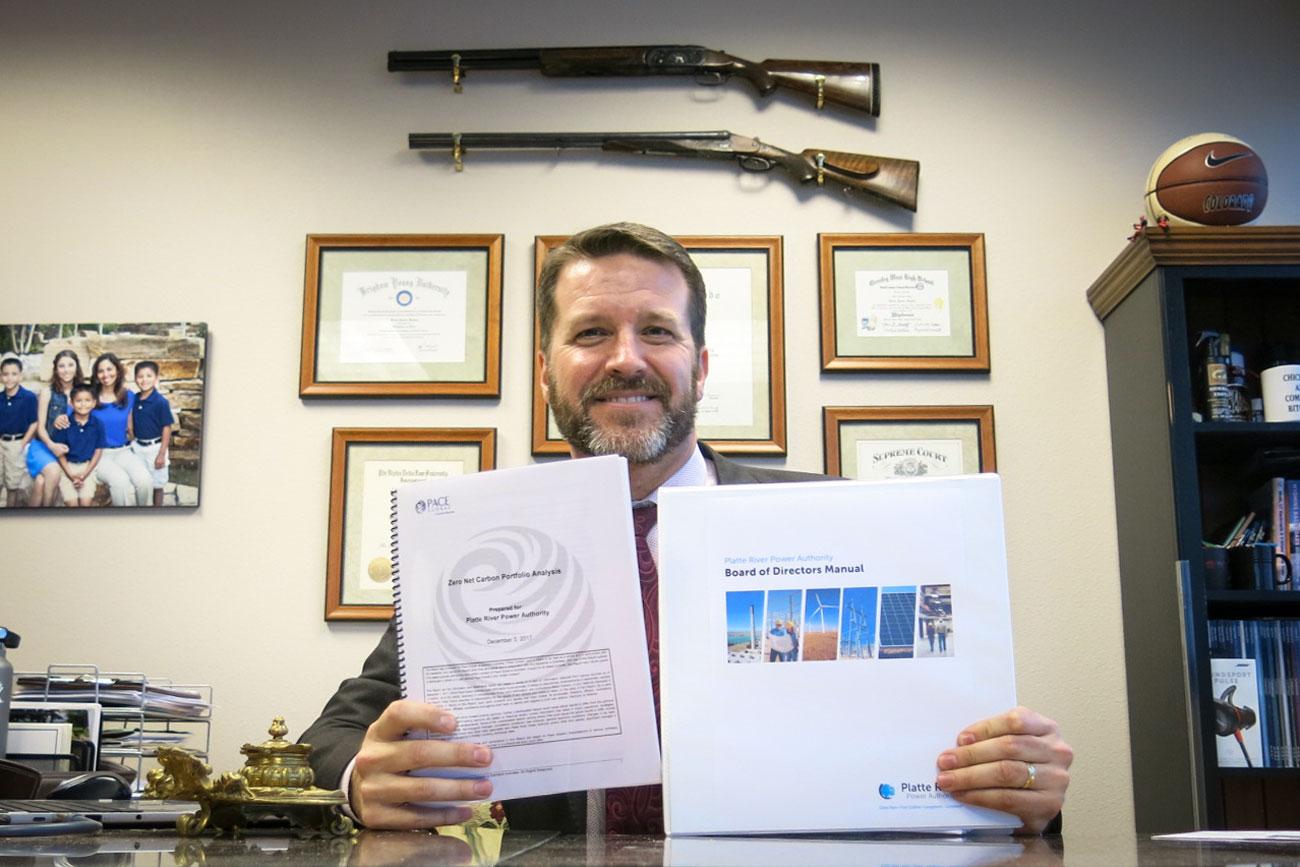

Brian Bagley isn’t the first person that comes to mind when you picture a wind or solar advocate. The 40-something Longmont mayor has a concealed carry permit and wears cowboy boots. Four antique shotguns hang on the walls of his law practice. He’s a former registered Republican, but switched to independent for the 2016 election.
Yet, in December, Bagley issued a mayoral proclamation for his city to pursue a 100 percent renewable energy source by 2030.
“I’m getting a lot of hits from the far right, saying ‘Oh, Bagley, you caved to the left. You tree hugger, you.’ What they don’t understand is it makes economic sense,” he said.
If Longmont’s city council members agree, they would join cities like Aspen, Boulder, Nederland, Breckenridge and Pueblo in going to or exploring renewable energy options. It’s a topic the public will hear lots more about this year. The Compact of Colorado Communities is expected to discuss both climate change goals and clean energy during their conference later in January. Some Democratic governor candidates want the state to pledge to go 100 percent renewable.
Democratic State Sen. Matt Jones, who represents Longmont and other northern Front Range cities, said he’ll introduce legislation to prompt utilities to move toward 100 percent because “the price of wind and solar has dropped like a rock”.
Utilities like Xcel Energy see that trend too. They are increasingly choosing renewables for new power sources because of tax credits and cheaper supply costs. Right now the state’s largest utility is reviewing plans with state regulators to move 55 percent of its electricity portfolio toward wind and solar.
But there’s a big challenge for cities that want to get to 100 percent renewable energy. Where does the power come from when the sun isn’t shining or the wind isn’t blowing?
Right now Boulder is pursuing one of the most challenging paths. They want state permission to form their own municipal utility. That means purchasing most of the infrastructure from Xcel. Kendra Tupper, Boulder’s Chief Sustainability Officer said the city has 13 years to figure out its most reliable electricity mix.
“There are ways that you firm up those renewable resources through storage through natural gas generators, through batteries, all kinds of things,” Tupper said.

Boulder and others pursuing these goals are waiting to see how technologies advance. Batteries could hold promise for storing wind or solar energy. But many utilities say the technology needs improvement before it can be widely used. It’s one reason why a nonprofit city-owned energy provider in Colorado commissioned a recent study to look at other strategies.
The Platte River Power Authority looked at a future mix of traditional and renewable energy sources. It produced initial estimates that show this plan could ultimately cost customers up to 10 percent more. So far, PRPA isn’t committing to any specific goals but plans to study the issue further.
“We are simply overproducing renewables to offset the carbon that we’re producing that ends up in a net zero result. So from our perspective, we’re zero net carbon,” said Jason Frisbie, general manager of PRPA, which supplies electricity to Fort Collins, Longmont, Estes Park and Loveland.
By way of comparison, the libertarian Independence Institute estimated that taking the state to 100 percent renewable energy could cost as much as $44.8 billion. There are challenges that come with predicting future costs including an uncertain policy landscape and the declining costs of supplies. Hitting a renewable goal by 2030 would involve a number of different players, Frisbie said.
“I think you have distributed generation, you have electric vehicles, you have energy efficiency,” he said. “So I think it’s going to be a comprehensive solution moving forward.”
Longmont Mayor Brian Bagley is encouraged by the Platte River report. He expects the Longmont city council to solidify his goal with a vote later in January.
So what will this mean for low-income customers who can’t afford a 10 percent rate increase?
Bagley advises a go-slow approach.
“Just like we don’t know about battery power. We don’t know about the future of pricing either,” he said. “Nobody’s saying right now we’re going to buy all 100 percent renewable today. We’re going to do it step by step.”
The new year will bring more progress toward renewable energy across the state. United Power Cooperative plans to pilot a community battery storage project in 2018. That’s in addition to battery storage projects Xcel has tested in Denver’s Stapleton neighborhood. It’s also testing battery strategies near Panasonic’s Denver headquarters as part of the Pena Station Next project.
Electric vehicles will also dominate discussions. Expect more talk on how Colorado plans to spend $68 million in VW settlement money on a play that will include electric charger stations. Gov. Hickenlooper also plans to finalize a statewide electric vehicle plan early in 2018.









